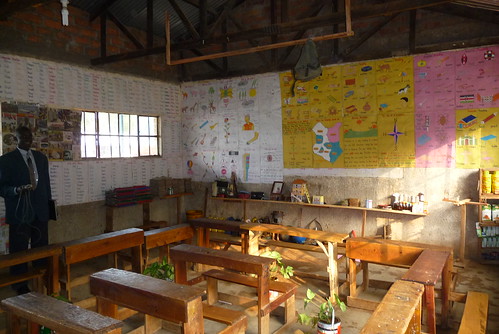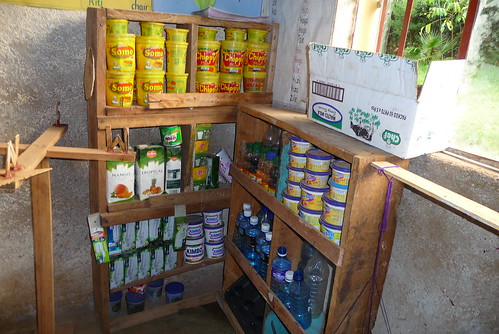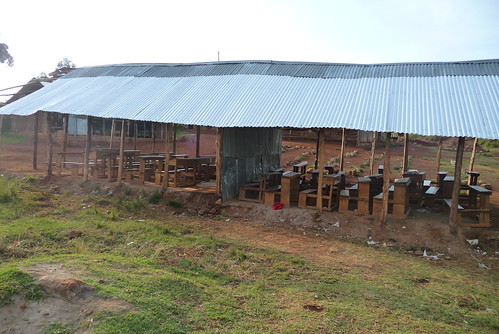As I’ve mentioned before, one of the projects Charlotte and I would work on during my time in Enoosaen was to conduct a background research with key schools in the area. The purpose of this research was threefold: to evaluate KCE’s strengths and weaknesses when compared to other schools; to have a better understanding of the other options for primary education in the region; and to learn about different structures of management as information for future projects. All the other projects (quilting/beading, needs assessment survey, spelling bee, etc.) are still underway, but we have finished the background research and I wanted to share some of the information we gathered.
In June and early July 2011, we visited 8 schools (both public and private) in the Transmara West District. In 6 of these schools we conducted brief observations and spoke to the administration to gather targeted information through a semi-structured questionnaire, at the other 2 we made brief observations and conducted a general informal interview with the administration. Although a post is hardly the appropriate venue to go about our finds at length, some of the findings included in our summary will help give a brief, but hopefully interesting, general view of the topics we observed:
- Type of school: although the easier access to funds is definitely an advantage that the private schools have over the public/sponsored ones, it seems to us that a school’s academic success is more dependent on the teachers’ commitment to the students rather than on the resources available. All of the schools have at least some religious affiliation, but it is not a financial benefit to them overall when compared to other sources of income.
- Student body: even though the total number of girls may be greater than the number of boys in certain schools, it is possible to see a shift from the fourth grade on, when boys usually outnumber girls. At the lower performing public schools in particular, it is also noticeable how the size of a class shrinks in the upper primary. These observations were more obvious from our visits to the schools which were not subjected to our semi-structured questionnaire.
- Staff: most of the schools visited do not offer any incentives to teachers, and this seems to be an acceptable practice in the area. Interestingly, private schools pay teachers less than public schools, but they are still able to hire quality staff due to the high number of professionals in the market. Finally, it was not possible to see a correlation between the teachers: student ratio and the school’s academic performance.
- Nutrition: public and private schools alike seem to suffer from the high price of food, and therefore there was no clear correlation between the type of school, the success rates, and the quality of food provided (meat, for example, is expensive and even private schools may not serve it). There was, however, a clear bias towards boarders, who are consistently offered better food.
- FGM/early marriage: on this topic, they all indicated their disagreements with the practice, but there is no consistency on how this is treated by the schools’ administration.
- Infrastructure: the income differences between the schools visited is more obvious when we assess their infrastructure and assets. Naturally, private schools offer their students better infrastructure, although it was interesting to notice that all schools had some sort of semi-permanent building that was not consistent with their main buildings.
- Familial support or community education: it seemed to us that much of a school’s success can be attributed to the degree of the participation that the parents have in the school’s life. In terms of community outreach/education, none of the schools are outstanding.
- Success rate: the schools visited, with few exceptions, were considered to be high performing schools in their respective districts. However, it is important to contextualize this by mentioning that the great Transmara area is considered to be amongst the areas with the poorest performance when ranked on a national level. Still, it is remarkable that public schools can sometimes be better ranked than private schools, and send their students to national and provincial high schools (the secondary school system in Kenya is divided into district, provincial, and national high schools, and your acceptance into one of these categories will depend on your grades, with national schools being the most competitive ones).
All in all, this research was a very interesting one to conduct, and by closely observing these schools we gained invaluable insight into how to improve KCE and what mistakes to avoid. We saw firsthand the abysmal differences between certain schools and how much some of them lack; yet, it was heartwarming to see teachers who are truly committed to their professions and parents who are concerned and involved in their children’s education.
Posted By Cleia Noia
Posted Jul 29th, 2011




